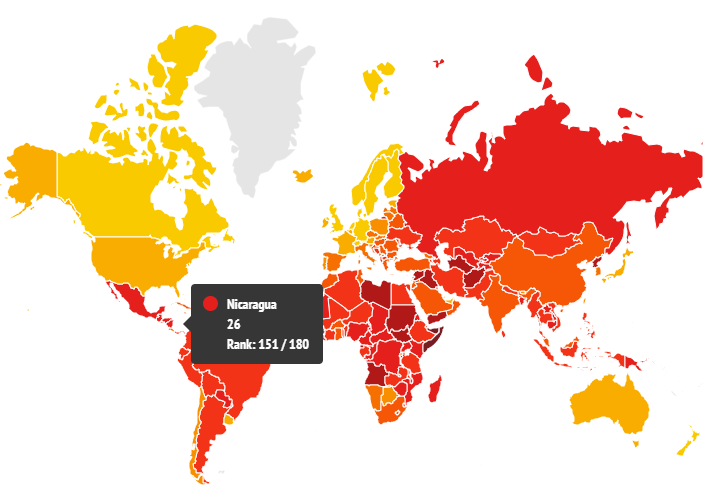
Children of Exile: The Births “Sowing Hope” in the Camp of Nicaraguan Farmers

PUBLICIDAD 1M
PUBLICIDAD 4D
PUBLICIDAD 5D
Transparency International presents its 2017 report on corruption

Transparency International presents its 2017 report on corruption Index
HAVANA TIMES – Nicaragua, Haiti and Venezuela are the Latin American countries where corruption is most prevalent according to the 2017 Perceived Corruption Index presented on February 22 by Transparency International. Nicaragua occupies 151st place among 180 countries, only surpassed in Latin America by Haiti (157th) and Venezuela in 169th.
The Latin American countries where corruption was considered the least were Uruguay in 23rd place and Chile 26th. Cuba is in 62nd place.
Nicaragua’s status in terms of perceived corruption had worsened with respect to the previous years. In the 2016 report from Transparency International, Nicaragua occupied 145th place out of 176 countries. In 2015 the country was in 130th place out of 167 countries evaluated by the organization. According to that year’s report, Nicaragua was already the third most corrupt country in Latin America.
The study measures the level of perceived corruption in the public sector using a scale of 0 (very corrupt) to 100 (completely clean). In this year’s study, Nicaragua maintains an average of 26 points, the same as in 2016 and one point below what it received in 2015.
Transparency International bases the results of its report on surveys and indicators for measuring corruption around the world. They also take as points of reference other reports elaborated by organizations such as the World Bank, the International Economic Forum, World Justice Project, International Country Risk Guide, Economist Intelligence Unit, and others.
On releasing the index for this year – in its 25th anniversary – Transparency International noted the “disturbing information” that: “Countries with the lowest protection for press and non-governmental organizations (NGOs) also tend to have the worst rates of corruption.” “Despite attempts to combat corruption around the world, the majority of countries are moving too slowly in their efforts.”
The index classifies 180 countries and territories according to the perceptions of experts and businesspeople on the level of corruption in the public sector. This year, the index concluded that more than two-thirds of the countries have fewer than 50 points, and that the mean score is 43.
The analysis of the results also went deeper into the relationship between the levels of corruption, the protection of freedom of the press and the participation of civil society. “We found that almost all journalists killed since 2012 were killed in countries with high levels of perceived corruption,” notes the report.
“No activist or reporter should have to fear for their lives when speaking out against corruption,” said Patricia Moreira, managing director of Transparency International. “Given current crackdowns on both civil society and the media worldwide, we need to do more to protect those who speak up.”
Archivado como:
PUBLICIDAD 3M
PUBLICIDAD 3D